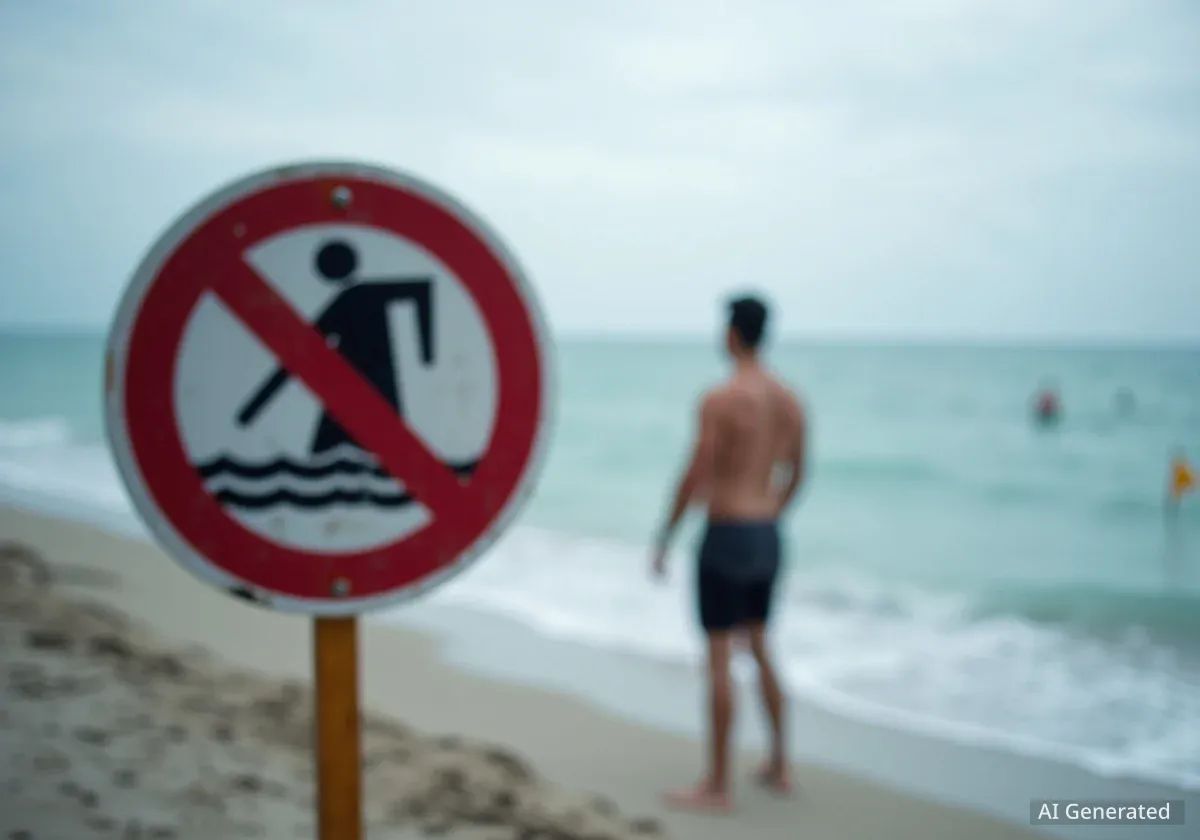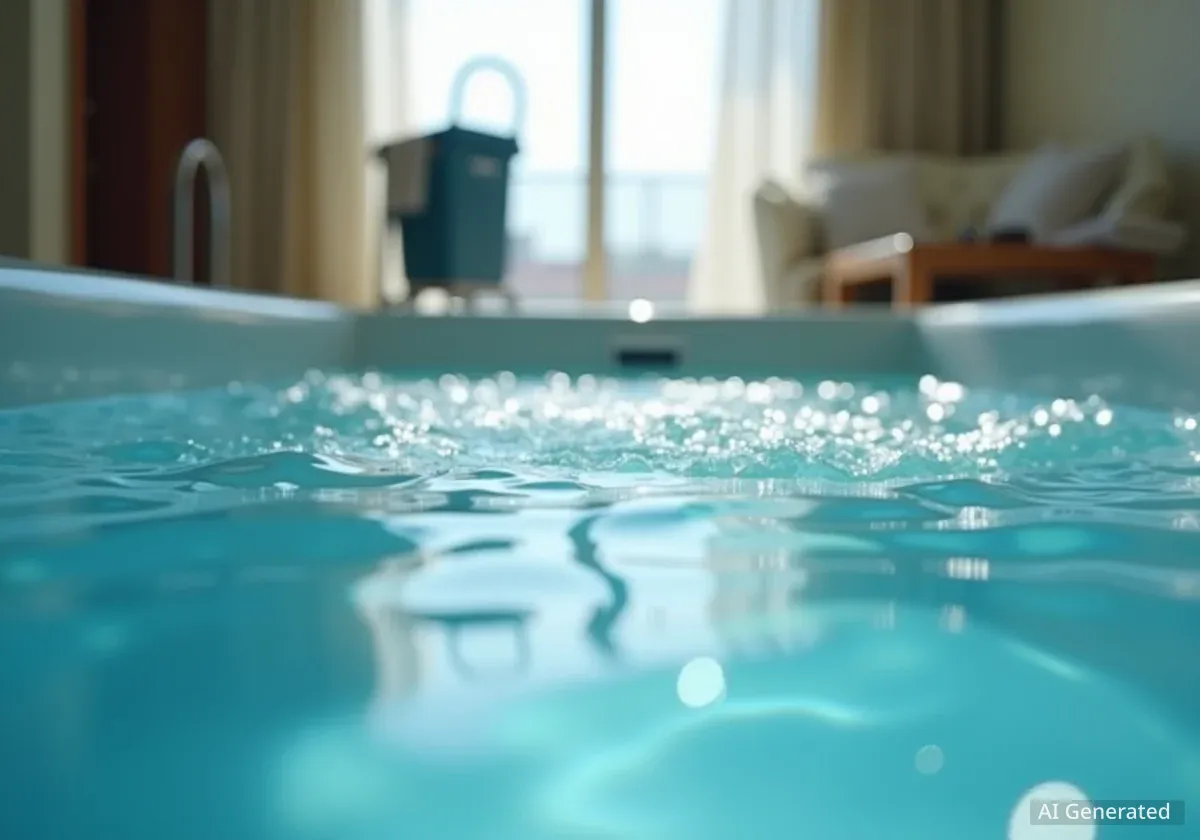Health officials in Miami-Dade County have issued a water quality advisory for Crandon Park North and South Point Drive Beach, urging the public to avoid all water-related activities. Tests show elevated levels of Enterococcus bacteria, indicating a potential health risk for swimmers.
Key Takeaways
- Crandon Park North and South Point Drive Beach are under a water quality advisory.
- High levels of Enterococcus bacteria were detected in recent water tests.
- Officials advise against swimming and other water activities due to increased illness risk.
- Enterococcus bacteria can indicate fecal contamination from various sources.
- The advisory will remain active until bacteria levels return to safe limits.
Public Health Warning for Beachgoers
The Florida Department of Health in Miami-Dade confirmed the advisory on Wednesday, September 26, 2025. This warning specifically applies to Crandon Park North in Key Biscayne and South Point Drive Beach (also known as South Beach Park) in Miami Beach.
Recent water samples, collected on Tuesday, September 25, 2025, showed that the water at these locations did not meet the state's recreational water quality standards. The primary concern is the presence of Enterococcus bacteria at levels considered unsafe for public recreation.
Important Water Quality Data
- Good Water Quality: 0-35 Enterococci per 100 milliliters of marine water.
- Poor Water Quality (Advisory Level): 71 or greater Enterococci per 100 milliliters of marine water.
Understanding the Risk to Swimmers
Officials have stated that avoiding water activities is crucial due to an increased risk of illness for individuals who swim or otherwise come into contact with the affected water. This risk includes various types of infections and rashes.
"If they are present in high concentrations in recreational waters and are ingested while swimming or enter the skin through a cut or sore, they may cause human disease, infections, or rashes," officials explained regarding the bacteria.
What is Enterococcus Bacteria?
Enterococcus is a type of bacteria commonly found in the intestines of humans and animals. Its presence in recreational waters serves as an indicator of potential fecal contamination.
According to the Florida Department of Health, this fecal pollution can originate from several sources. These include stormwater runoff, waste from pets and wildlife, and human sewage. The exact source of the current elevated levels at Crandon Park North and South Point Drive Beach has not been specified.
Background on Water Quality Monitoring
Local health departments regularly monitor water quality at public beaches across Florida. These tests are part of a broader effort to ensure public safety and inform residents and visitors about potential health hazards related to recreational water use. Advisories are issued when bacteria levels exceed established safety thresholds.
Impact on Local Beaches and Tourism
Crandon Park North and South Point Drive Beach are popular destinations for both locals and tourists. The advisory means that activities such as swimming, wading, and other direct water contact are currently not recommended. This can affect daily routines for residents and travel plans for visitors.
The advisories are temporary measures. They aim to protect public health while authorities work to ensure the water is safe again. Local businesses near the affected beaches may experience a temporary decrease in activity as people avoid water-related recreation.
When Will Beaches Be Safe Again?
Authorities confirm that the water quality advisory will remain in effect until subsequent tests show that bacteria levels have dropped below the accepted health standard. Regular retesting will continue until the water is deemed safe for recreational use.
The public can access the latest test results and updates on water quality at FloridaHealth.gov/HealthyBeaches. This online resource provides transparent information for all affected areas, allowing individuals to stay informed about beach conditions.
Staying Informed and Safe
Residents and visitors are advised to heed the warnings from health officials. It is important to avoid contact with the water at Crandon Park North and South Point Drive Beach until the advisory is lifted. This precaution helps prevent potential illnesses.
Even when advisories are not in place, it is good practice to be aware of your surroundings at the beach. If you notice any unusual water discoloration or odors, it is always best to avoid entering the water and report your observations to local authorities.
- Check Official Websites: Always consult FloridaHealth.gov/HealthyBeaches for the most current information.
- Observe Signage: Pay attention to any posted signs at beach entrances regarding water quality.
- Report Concerns: If you see any potential sources of pollution, inform local environmental or health departments.
The health department will provide updates as new test results become available. The goal is to restore these popular South Florida beaches to their normal, safe conditions for everyone to enjoy.





